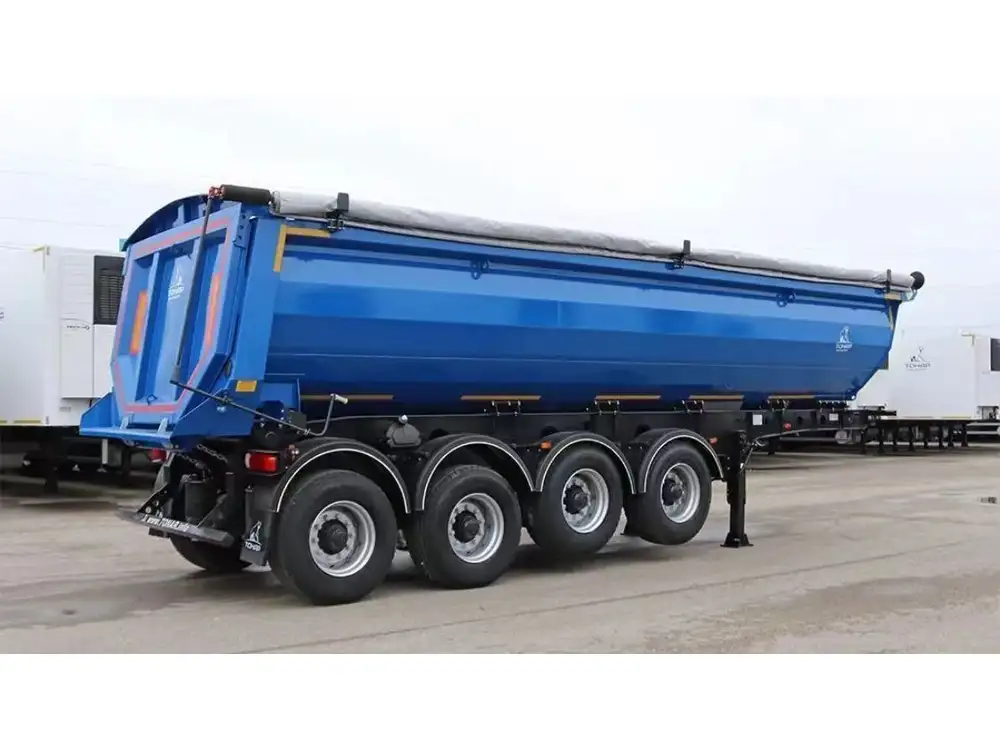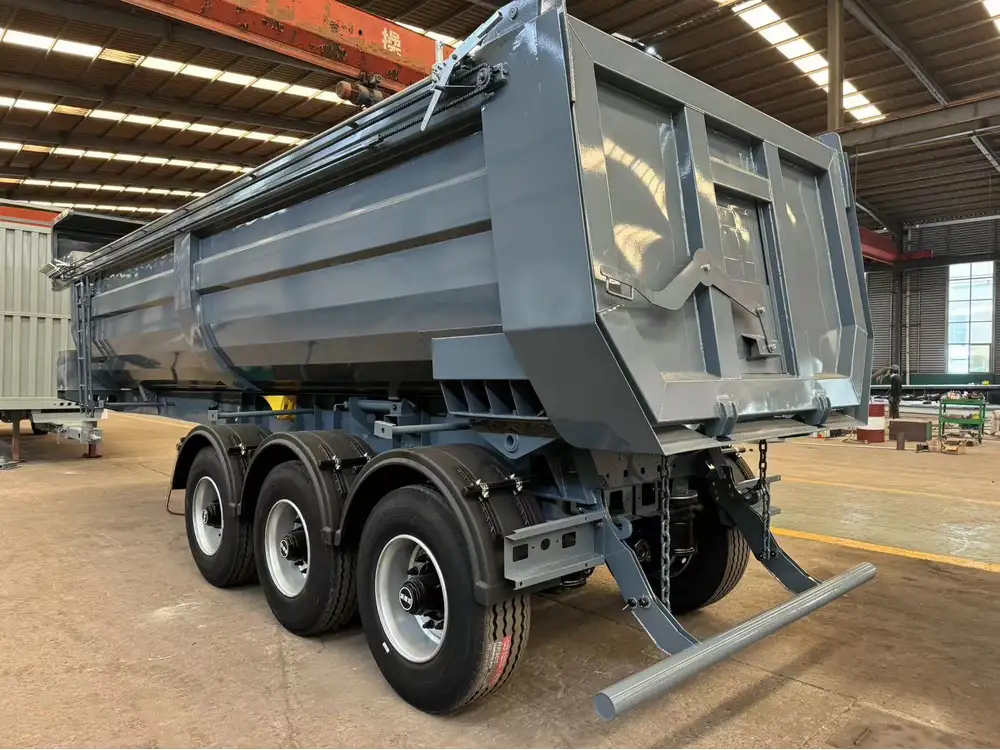In the realm of transportation and logistics, the skeletal twin trailer has emerged as a pivotal innovation, enhancing efficiency and operational capacity for various industries. As semi-trailer manufacturers, we provide insights into these specialized trailers, delving into their design, benefits, and applications in a competitive market.
What Are Skeletal Twin Trailers?
Skeletal twin trailers, often referred to simply as skeletal trailers, are an advanced type of semi-trailer designed to transport containers, particularly in intermodal shipping. They comprise a lightweight frame that allows easy handling of cargo without significant dead weight. The design typically features:
- Two Axles: Providing increased stability for heavy loads.
- Customizable Length: Supporting various container lengths, including 20ft, 40ft, and even 45ft options.
- Enhanced Load Capacity: Allowing for maximum efficiency in transporting containers.
| Feature | Description |
|---|---|
| Axles | Typically 2, offering stability |
| Material | High-strength steel for reduced weight |
| Length | Configurable for various container sizes |
| Weight Capacity | Designed for high-capacity transport |
These trailers are a staple in global supply chains, enabling seamless transfer between ships, trains, and trucks.
Advantages of Skeletal Twin Trailers
Skeletal twin trailers deliver a myriad of benefits that enhance operational efficiencies while reducing overall costs. Here are key advantages:

1. Lightweight Design
The lightweight structure of skeletal twin trailers allows for increased payloads without exceeding the legal weight limits. By reducing the trailer’s own weight, more cargo can be transported in a single trip, leading to higher revenue potential.
2. Versatility in Use
These trailers are designed to accommodate various container types and sizes, making them incredibly versatile. Whether transporting refrigerated goods or standard containers, skeletal twin trailers adjust to meet diverse industry demands.
3. Improved Fuel Efficiency
By minimizing the trailer’s weight, operators can significantly improve fuel efficiency. A lighter vehicle requires less energy to operate, thus leading to reduced operational costs and a lower carbon footprint—a critical factor in today’s environmentally conscious market.

4. Enhanced Stability
The design elements of skeletal trailers ensure superior stability, especially when carrying heavy loads. Enhanced stability translates to improved safety on the road, decreasing the risk of accidents and damages.
5. Economical Transportation
Due to their versatility and weight efficiency, skeletal twin trailers offer a cost-effective solution for transporting goods. Companies can optimize their logistics operations by using fewer trips to move the same amount of cargo, directly impacting the bottom line.
Applications of Skeletal Twin Trailers
Skeletal twin trailers serve a wide range of applications across various sectors. Here are some primary uses:

Intermodal Shipping
The primary application of skeletal twin trailers is in intermodal shipping, where containers are transferred between different modes of transport, such as ships, trains, and trucks. Their design facilitates quick and efficient handling, ensuring that goods move smoothly through complex supply chains.
Construction Industry
In construction, skeletal trailers are often utilized to transport heavy machinery, tools, and mixed materials. Their stability and robust construction make them suitable for moving large equipment to and from job sites under varying conditions.
Retail and Distribution
Retailers and distribution centers benefit from the use of skeletal twin trailers for transporting goods. Their pattern of use allows for efficient load handling, reducing the time goods spend in transit, which is essential for companies operating just-in-time inventory systems.

Agricultural Products
The agricultural sector utilizes skeletal trailers to transport bulk products such as grains and agricultural equipment. The versatility of these trailers allows farmers and distributors to efficiently manage transportation across long distances.
Key Considerations When Choosing a Skeletal Twin Trailer
Selecting the right skeletal twin trailer involves several critical considerations to ensure that the chosen model meets operational needs and budget constraints.
Weight Capacity Requirements
Determine the maximum weight capacity your operations require. Different skeletal trailers have varying load capacities, and selecting one adequately suited to your needs is essential for safe transportation.

Trailer Length
Since skeletal trailers are available in different lengths, consider the types of containers you’ll be transporting. Common lengths include 20ft and 40ft configurations, but options extend up to 45ft for larger cargo.
Material and Durability
Evaluate the materials used in constructing the skeletal trailer. High-strength steel and corrosion-resistant coatings will enhance durability and extend the lifespan of the trailer, ensuring it can withstand harsh conditions over time.
Cost-Effectiveness
Analyze your budget against the long-term benefits of investing in skeletal twin trailers. While initial costs may vary based on the model and specifications, the potential savings in operational costs can justify the expenses.

Safety Features
Ensure the trailer is equipped with essential safety features such as anti-lock braking systems, reflective materials, and load distribution enhancements. These elements contribute to safer transportation and compliance with regulations.
Maintaining Your Skeletal Twin Trailer
Regular maintenance is essential to ensuring the longevity and safe operation of your skeletal twin trailer. Here are crucial maintenance tips:
Regular Inspections
Conduct routine inspections to identify signs of wear and tear. Check components such as axles, brakes, and tires to ensure they are functioning correctly. Addressing minor issues promptly can prevent significant problems later on.

Cleaning
Keep the trailer clean to prevent rust and deterioration. Regular washing, especially after transporting corrosive materials, will help extend the lifespan of the trailer.
Lubrication
Apply lubrication to moving parts regularly. Properly lubricated components operate more efficiently and reduce wear and friction, contributing to the overall longevity of the trailer.
Record Keeping
Maintain detailed maintenance records, documenting all inspections, repairs, and services performed. This practice aids in tracking performance over time and can be invaluable for resale purposes.

The Future of Skeletal Twin Trailers
As technology evolves, skeletal twin trailers are poised to undergo significant advancements. Key trends that could shape the future of these trailers include:
Advanced Materials
The introduction of lighter and even stronger materials, such as composites and alloys, could revolutionize trailer construction. Such advancements would enhance payload capacities while maintaining structural integrity.
Smart Technology Integration
Incorporating smart technology will allow for enhanced tracking and monitoring. GPS-enabled systems can provide real-time information on the trailer’s location and condition, optimizing logistics and supply chain management.

Sustainability Focus
With increasing pressure on industries to adopt sustainable practices, future skeletal twin trailer designs may prioritize eco-friendly materials and energy-efficient technologies, contributing to an overall reduction in carbon footprints.
Conclusion: Optimizing Your Fleet with Skeletal Twin Trailers
Skeletal twin trailers represent a formidable option for those in the logistics and transportation industries. With their lightweight design, versatility, and cost-saving capabilities, these trailers are a crucial component for optimizing fleet operations. Understanding the advantages, applications, and maintenance of these trailers is vital for any business aiming to enhance its transportation solutions.
For manufacturers and fleet operators alike, investing in high-quality skeletal twin trailers can lead to substantial long-term benefits, from improved fuel efficiency to increased load capacity. As the market evolves, remaining attuned to trends and innovations will ensure that your operations stay competitive and efficient, paving the way for sustainable growth.



